If you would like to subscribe to receive our regular newsletter for all important events and updates, please complete the information below.
Image by Dan Alcade under a CC BY-NC-ND license.
Transitions 9 Programme
Transitions 9: New Directions in Comics Studies 8-10 April 2021 Programme (Time zone: BST/UTC+1) THURSDAY 8 April 2021 15:00 – 15:15 Welcome 15:15 – 16:45 Panel 1 1.1: Periodicals 1.2: Bodies Sara Dallavalle Comics Magazines: Not only Comics but also Criticism Jonathan Bass The Rube Goldberg Case: The Panel as Paradigm in Newspaper Comics and New York Dada Kristian Hellesund Migration in Three Early American Newspaper Comics Jose L Garcia Politics of Body Prostheses, Disability, and Replacement in Aaron Diaz’s Dresden Codak Sharmistha Chatterjee Examining the Diseased Material Body in Stitches Eszter Szép Drawing and Transforming the Body in Ken Dahl’s Monsters 16:45 – 17:00 Break 17:00 – 18:15 Keynote Frames of Thought Dr Nick Sousanis (San Francisco State University) FRIDAY 9 April 2021 10:00 – 10:15 Day’s Welcome 10:15– 11:45 Panel 2 2.1: Adaptations and Pastiche 2.2: Cultural Memory Audrey Chan Alberto Breccia’s Parody of Futurist Paintings in Graphic Narratives Miloš Tasić and Dušan Stamenkovic Visualising an Oral Epic: Lobačev’s Comic Book Ženidba Dušanova Oskari Rantala V for Pissed-offed-ness vs. Vendetta A case of anti-immigrant subversion of comics intertexts Jakob F. Dittmar and Anders Høg Hansen Pasts renewed in new German graphic storytelling Lena Holec Ravnikar Preservation of Slovene Literary History in Comics Hakan Keleş Expanded frame, time and space: 80’s Urban Atmosphere at Arabacıoğlu’s “Panorama” Pages 11:45 – 13:30 Panel 3 3.1: Curating, Constructing and Countering Women's Histories 3.2: Practice-based Research Neha Yadav Whose Line is it Anyway: Graphic Anthology Drawing the Line as a Counter-narrative to Mainstream Rape Reportage in India Andrea Aramburú-Villavisencio Curating the Ordinary: Relationality and Affect in Latin American Women’s Autobiographical Comics Esther McManus Constructing Inclusive Histories: Reflections on the temporality of comics and activist archives Natasa Thoudam In Search of a Form while Inventing a Language of Subversion through Stereotypes Daniel Merlin Goodbrey How to Cheat at Comics: Digital alternatives to traditional techniques for comic illustration Irina Richards Narrating cultural heritage through comics: a graphic investigation into witch-hare folklore of Wales 13:30 – 14:00 Lunch 14:00 – 15:30 Panel 4 4.1 4.2 Individual & Community Driss Faddouli Moroccan Facebookers and the Visual Rhetoric of Political Negation Ibtisam Ahmed The Utopian Critical Mass of Spider-Man Barbara Eggert Family Issues In Early Moomin Comic Strips Processes and products of drawing Clari Searle Creating ‘Funnies’: how to build an effective creative process for Higher Education pedagogy Peter Hebden The Stuff of Dreams: Objects and Disorientation in the work of Julie Doucet and Anders Nilsen Dom Davies Fracking Hell! Joe Sacco’s Seismic Lines 15:30 – 15:45 Break 15:45 – 17:00 Keynote Comics Studies and Education in Germany, 1950-2020 Prof Dr Sylvia Kesper-Biermann (Universität Hamburg) SATURDAY 9 April 2021 10:00 – 10:15 Day’s Welcome 10:15– 11:45 Panel 5 5.1 5.2 Graphic Medicine Iona Lindsay, Amie Huttie, Katie Laing, Hisham Khan, Bryoni Welsh and Frankie Posner Using comics and Graphic Medicine to explore and examine medical student experiences of training during the evolving coronavirus outbreak Lottie Corr A picture of health: Using Graphic Medicine to cultivate empathy and widen student perspectives at medical school Muna Al-Jawad The evolution of comics as a research method in health humanities Experiences of Otherness Anna Marta Marini Barrier and the representation of the US internal/external boundaries Alessia Mangiavillano Fieldwork...
read moreCoastal Dystopias
18 March 2021, 2-3.30pm GMT Online via Zoom (booking required) CCL Director Dr Caroline Edwards (Birkbeck) will be speaking about "Coastal Dystopias" as part of the Institute for Historical Research (IHR) series on "Coastal Connections." Caroline will join Prof. Dr. Silja Klepp (Kiel), Dr Yi-Chia Chen (UColorado-Denver) and Prof. Dr. Teresa Sabol-Spezio (Independent Scholar, formerly at the Rachel Carson Center for Environment and Society) to discuss how coastal regions have inspired utopian and dystopian anticipations of ravaged future societies set amidst environmental crisis, calamity and apocalyptic devastation. The Coastal Connections series is running in Spring 2021 to extend interdisciplinary research connections relating to coastal histories. It is convened by James L. Smith (University College Cork), Tuba Azeem (Victoria University of Wellington), Melanie Bassett (University of Portsmouth), Elsa Devienne (Northumbria University), Xiaofei Gao (University of Colorado), Joana Gaspar de Freitas (University of Lisbon); Isaac Land (Indiana State University), David Worthington (University of the Highlands and Islands), Hannah Boast (University College Dublin) and Harrie Neal (University of York). Event description: While traditional histories of shorelines often focused on the triumph of the seaside leisure economy or perhaps on subsistence-related activities such as navigation and fisheries, recent developments have cast a grim shadow on the site at which land and sea meet and have forced scholars to rethink coastal history in a more dystopian light. Beaches, for example, are no longer simply associated with innocence, freedom and sensuality, they are places of refuge—providing shelter for Australians fleeing fires in January 2020—sites of muted or open military conflict—as seen most recently in the case of Varosha in Northern Cyprus—and, most tragically, the last resting place for many refugees attempting the Mediterranean crossing to Europe. In parallel, many artists have recently invested the coast with dystopian scenarios, from Kim Stanley Robinson’s novel New York 2140 to J. A Bayona’s film The Impossible. This phenomenon is actually not as new as it may seem at first sight. While many utopias have been set at the water’s edge, other narratives engaged with the dramatic quality of the shores with The Beach (1959), a Cold War movie dramatizing a nuclear doomsday, being a prime example. These cultural products remind us that the history of shorelines cannot be reduced to bathing beauties and dazzling resorts. In this seminar session, speakers coming from different disciplines (including history, geography, and literature) will discuss their research into the dystopian qualities of shorelines across the world. They will ask: why have coastlines been the (imagined or real) sites where a diverse array of dystopian scenarios have unfolded? Is there something new about the twentieth century and our present moment that makes coastlines appear particularly dystopian? How can we reconcile utopian/dystopian visions of the shoreline? And, finally, are all coastlines doomed, or are there more constructive ways to think about paths forward? All welcome, this seminar is free to attend but booking is required. Book your place here. For more information about the IHR "Coastal Connections" seminar series, contact: ihr.events@sas.ac.uk. For more information about the MA Contemporary Literature and Culture that Dr Caroline Edwards directs, please see here. Featured image by Enrapture Captivating Media on...
read moreCFP: Transitions 9 Conference
CALL FOR PAPERS: TRANSITIONS 9 – new directions in comics studies 2021 Online 8-10 April 2021 Hosted By BIRKBECK, UNIVERSITY OF LONDON Following the cancellation of Transitions 2020, we are delighted to re-announce the call for papers for Transitions 9 in 2021. Transitions is a platform for emerging research in comics that is free to attend and participate. This event is focused towards postgraduate and early career speakers, and draws a diverse crowd of both new and more established researchers, as well as creators, aficionados and other interested parties. Our aim is to build connections between comics scholars working in diverse contexts of research and practice, to provide a platform for productive debate, and to create a space from which further collaborations can emerge. Key note speakers: Prof Dr Sylvia Kesper-Biermann (Universität Hamburg) and Dr Nick Sousanis (San Francisco State University) Respondent(s): TBA Rather than adopting a narrow theme, the shape and identity of the programme will emerge from the submitted papers. We thus welcome abstracts for 20 minute papers, or pre-constituted panels of three, on topics including (but not limited to): Comics, comix, comic strips, graphic novels, manga, manhwa, bande dessinée superheroes, adventure, war, horror, fantasy, crime, romance, humour & other genres; documentary/historical/journalistic comics, autobiographical/biographical modes, graphic medicine politics of representation and inclusion in comics texts and productions, formal approaches, transgressive comics, educational and didactic comics, comics for young adults & children readers and fandoms, creators, comics & the law, publishing histories, web-comics & comics exhibitions, transnational circulation, political economy of comics Since Transitions this year will be held through video conferencing, we ask that presenters record a 20 minute presentation in advance, which will be followed by live q&a sessions for each panel. Further details for pre-recorded presentations will be shared once proposals have been confirmed. As always, Transitions 9 will be free and open to all. Please send your proposal to transitionssymposium@gmail.com. Please attach your abstract of 250-300 words plus a short biographical note (preferably as a Word document), indicating ‘abstract’ in the email subject line and your name in the file’s title. This year we are also seeking volunteers to sketchnote / visually record each panel, in order to compile a visual record of the conference. If you’d be interested in recording a panel, please email us a couple of (low-res) images or a link to an online portfolio at the above address with ‘sketchnoting’ in the subject line. You do not need to be submitting a paper to take part in this. The deadline for submissions is 7 March. We aim to notify applicants by 14 March. With best wishes, The Transitions Team John Miers, Tobias Yu-Kiener, Chantal Cointot and Hallvard...
read moreMIR Live 2021
The CCL's very own Mechanics' Institute Review (MIR) is launching a new online series of evening events, MIRLive. Our first MIRLive of 2021 on Friday 26th February will be headlined by Femi Kayode whose debut novel Lightseekers comes out February 4th, published by Raven Books. Femi Kayode grew up in Lagos, Nigeria. He studied Clinical Psychology at the University of Ibadan and has worked in advertising over the last two decades. He was a Packard Fellow in Film and Media at the University of Southern California and a Gates-Packard Fellow in International Health at the University of Washington, Seattle. His writing credits include several award-winning works for the stage and screen. In 2017 he was awarded the UEA Literary Festival Scholarship, which helped to fund his MA in Creative Writing Crime Fiction. Whilst studying at UEA, his debut novel Lightseekers won the Little, Brown/UEA Crime Fiction Award. He lives in Namibia with his family. The show starts at 7.30 pm (GMT) Reading alongside Femi will be: Linda Mannheim Liam Hogan Tom Browning David Plans Stephen Vowles Elizabeth Holli Wood Watch Live via our Youtube Channel SUBMISSIONS ARE NOW CLOSED. Each event features a range of UK-based writers, from established authors to the next generation. Valuing diversity in literature, MIRLive is an inclusive and inspiring night. It is hosted by writers and comedians Kayleigh Cassidy and Alexandra Petropoulos, so expect a fun and engaging evening. It really is the best place to enjoy fresh writing within a supportive community. Guest authors to date include Bernardine Evaristo, Jonathan Coe, Abi Dare, Louise Hare, Derek Johns, Hari Kunzru, Susan Elderkin, Zoë Fairbairns, Russell Celyn Jones, Peter Hobbs, Benjamin Markovits, Erica Wagner, Marie Phillips, Kate Pullinger, Helen Simpson, Richard T. Kelly, Jeremy Sheldon, Sarah Salway, Jean McNeil, Rich Hall, Julia Bell, Richard Milward, Emer Martin, Blake Morrison, Nii Parkes, Robert Hudson, Amanda Smyth, Chloe Aridjis, Magnus Mills, A.L. Kennedy, Niall O’Sullivan, Alex Preston, Toby Litt, Monique Roffey, Michael Rosen, Mez Packer, Zoe Gilbert, Alan Beard, and Ronan Hession. The MIRLive team will put out a call for submissions for each event and readers may also be selected from the wider submissions pool. As we read your submissions, we may find a piece of work that we feel would be excellent read aloud and will get in touch to ask you to appear at one of our spoken-word events. If you feel that your work would be great for MIRLive, please do flag this up to us in your submissions email. Find out how to submit your work to The Mechanics’ Institute Review here. Submissions for MIRLive should be prose of up to 1500 words and poetry up to 150 lines. If your work is selected, you will be asked to provide a brief (+- 50 words) biography written in the 3rd person, and a photo, to include on a handout and publish on the website. Subject to the author’s permission, a podcast of the reading may be made available on the website. Copyright remains with the individual autho For more information visit the MIR Online website. Featured image by Photo by Joshua...
read moreIn Conversation with Jaspreet Kaur
Friday 26 February, Format: Online, 6.30-8pm Please book a place here Spoken word artist and teacher Jaspreet Kaur will be in conversation with Dr Ben Worthy (Birkbeck) to discuss her new memoir/manifesto Brown Girl Like Me (forthcoming Autumn 2021). The event is organised in connection with Jaspreet's work as the current Ben PiImlott Writer in Residence and is co-organised by the Birkbeck Centre for British Political Life and the Centre for Contemporary Literature. Brown Girl Like Me is an inspiring memoir-manifesto challenging existing portrayals of young South Asian women in the UK; providing a millennial perspective on how brown women navigate and balance the intersectionality of their identities in the new political climate. This book will ask and answer urgent questions about the current state of the world for young British Asian women through interviews with brown women across the country. Brown Girl Like Me aims to empower, support and equip brown women with the confidence and tools to navigate the difficulties that come with an intersectional identity, unpacking key issues such as the home, the media, the workplace, education, mental health, culture, confidence and the body. For more information about Jaspreet, see here: http://www.behindthenetra.com/ For more information about Jaspreet's memoir-manifesto, Brown Girl Like Me, see here: https://www.thebookseller.com/news/bluebird-snaps-kaurs-agenda-setting-debut-1206744# Featured image on the website homepage by Bold Content shared under a CC By 2.0...
read moreThe Robots Are Us
CCL members Prof. Roger Luckhurst and Dr Caroline Edwards featured in a recent radio programme on BBC Radio 3 broadcast on Sunday 10 January 2021. Titled "The Robots Are Us" and presented by Ken Hollings, the programme looked at the legacy of Karel Čapek's play Rossum's Universal Robots (R.U.R.) on the 100th anniversary of the play's premiere in Prague's National Theatre in January 1921. Programme description: In January 1921, in a Europe still reeling from war and revolution, the Czech writer Karel Čapek created a worldwide hit with his 'comedy of science and truth' R.U.R. (Rossum's Universal Robots), flesh not metal, are sold around the world first to create a world free from arduous labour and then to fight our wars. Free from consciousness or feelings. What could possibly go wrong? Humanity stops breeding and a new class of feeling robots strike out for a brave new world once humankind is all but exterminated. This now seems awfully familiar but in 1921 not so much. Ken Hollings examines the creation and legacy of a play that both gifted the world the word Robot and began an enduring cliché that intelligent machines will rise up and destroy us. Written before pulp science fiction and at the height of Taylorism and the Ford assembly line, it found an international audience anxious about the fate of workers and work, revolution and mass production. But Čapek's fleshy creations, more replicant that TOBOR, would soon be overlayed with the image of the clanking metal machine that would surely seek world domination on the covers of pulp science fiction and movies. In fiction the SKYNET is always falling, our robot overlords must be welcomed and the singularity is just around the corner. The science of Robotics would only begin in earnest decades after R.U.R. and A.I. and its ethical conundrums of existence, rights and reasoning belong to our 21st century yet Capek's notion of the revolt of the machines still dances through our debates and imagination. Ken Hollings talks to historians, roboticists, to grasp the power of R.U.R. and all that has followed. Click here to listen to the programme on BBC Sounds. For further information on the MA programmes that Prof. Roger Luckhurst and Dr Caroline Edwards direct, see our MA Modern and Contemporary Literature and MA Contemporary Literature and Culture. Featured image by Марьян Блан | @marjanblan on...
read moreNotes on Camp, 2020
Birkbeck PhD student Dickon Edwards recently gave a short talk on the relevance of camp to a number of recent literary and theoretical works published in 2020. Delivered as part of our biannual PhD Conference held on 17 December 2020, Dickon’s talk, titled “Notes on Camp, 2020,” considered different forms of camp performance, including cosplay, wearing masks, and drag as a strategy of healing. You can watch a recording of Dickon’s talk and PowerPoint below, or read the transcript underneath. Featured image by Bret Kavanaugh on Unsplash Notes on Camp 2020 At this time of year there is a tradition in the media to publish reviews of the 12 months just gone. The following talk represents my own survey of the year 2020, in terms of the new books and cultural events which appeared on the radar of my research. 1. Camp Modernism – definitions My research is on camp modernism. This can be thought of as the intersection between ‘Camp’, which is typically associated with exaggeration and irony, external surfaces, externalised behaviour, and is particularly associated with the history of homosexual subcultures. ‘Modernism’, meanwhile, is a label often associated with fragmentation, with depth, and with interiority. Until recently these two concepts were thought incompatible. So much so, that modernism has sometimes been thought of as a mainly heterosexual idea, because it doesn’t easily lend itself to camp. 2. Books of the Year There is certainly a hint of that theory in the title of one of my books of 2020. No Modernism Without Lesbians by Diana Souhami suggests in its title alone that if modernism is associated with depth and internalised experience, it has tended to mean, by default, heterosexual depth and heterosexual experience. Souhami’s title is even something of a camp flourish, suggesting that modernism is just another artificial category, as with gender and sexuality, that needs to be played with and questioned. The book explicitly mentions camp in the case of the work of the writer Gertrude Stein, who often used humour, innuendo and wordplay to create a space for a form of modernist lesbian identity. Decadent Catholicism by Martin Lockerd, meanwhile, touches on the complicated way that Victorian decadence drew upon the aesthetics of Catholicism yet playfully mocked those as well. Indeed, this type of decadence then evolved into the more secular style of twentieth-century camp. The single most referenced essay on camp, Susan Sontag’s ‘Notes on Camp’ (1964) is not only dedicated to Oscar Wilde, but it is written in the style of Wilde’s aphorisms, which is one reason why it’s so eminently quotable. Masks is a collection of essays by Slavoj Zizek and others, loosely inspired by the way David Bowie used masks of different personae to make his music. The book includes a new essay on the Edwardian novelist Ronald Firbank, who my thesis argues is the most useful example of camp modernism in literature. 2020 has rather turned out to be the year of the mask, so the Masks book helps to remind the reader how a mask can be a happy tool of positive artistic liberation as opposed to an unhappy tool of enforced medical restriction. The year also saw the first proper collection of essays on Brigid Brophy, who wrote the most substantial book on Ronald Firbank, Prancing Novelist...
read moreKatherine Angel LRB Book Launch
1st March 2021, 7pm (LRB bookshop online) CCL member and Director of our MA Creative and Critical Writing, Dr Katherine Angel, will be launching her new book at the London Review of Books on 1st March 2021 at 7pm (GMT). Titled Tomorrow Sex Will Be Good Again: Women and Desire in the Age of Consent, Katherine Angel will discuss the work in conversation with Olivia Laing, author of Funny Weather (Picador). Spanning science and popular culture, Tomorrow Sex Will Be Good Again examines pornography and literature, debates on #MeToo, consent and feminism to challenge our assumptions about women’s desire. Why, she asks, should they be expected to know their desires? And how do we take sexual violence seriously, when not knowing what we want is key to both eroticism and personhood? In today’s crucial moment of renewed attention to violence and power, Angel urges that we remake our thinking about sex, pleasure, and autonomy without any illusions about perfect self-knowledge. Only then will we fulfil Michel Foucault’s teasing promise, in 1976, that “tomorrow sex will be good again.” The book has already been described as “a provocative, elegantly written analysis of female desire, consent, and sexuality in the age of MeToo.” Olivia Laing calls it “[a]n ardent, rigorous, nuanced investigation into the question of consent, at once illuminating and empowering. A truly vital guide to navigating the difficult waters of 21st century desire.” To book your ticket for the LRB online book launch, click here. To pre-order a copy of Tomorrow Sex Will Be Good Again, click here. For further information on the MA Creative and Critical Writing that Katherine Angel directs, click...
read moreRadical Attention Book Launch
CCL member and Director of Birkbeck’s MA in Creative Writing, Julia Bell, recently launched her new book Radical Attention, which was published by Peninsula Press in October 2020. You can watch the launch event below, in which Julia Bell discusses how attention has been commodified within digital capitalism with Olivia Laing. Radical Attention is an extended essay on the battle for our attention in the age of distraction. In today’s online economy, attention has become a commodity to be bought and sold. Bombarding us with free smartphone apps and news websites, developers and advertisers have turned what and how focus our attention into the world‘s fastest growing industry. In exchange for our attention, information and entertainment is ever at our fingertips. But at what cost? In this essay, at once personal and polemical, meditative and militant, Julia Bell asks what has been lost in this trade off. How can we reclaim our attention? In a world of infinite distraction, how can attention become radical? Olivia Laing has called Radical Attention a “[t]errifying, clarifying and ultimately hopeful, this is an essential book. Julia Bell grapples with the grim realities of our online lives, setting out possibilities for resisting and reclaiming our imperilled freedoms.” For more information about Birkbeck’s MA Creative Writing, which Julia Bell directs, please click...
read moreLSFRC Reading Group, 2020-21
From Sultana’s Dream, Chitra Ganesh (2018) The London Science Fiction Research Community (LSFRC) are proud and excited to share the theme for their 2020-21 reading groups and conference: Activism and Resistance. The theme is open to be shaped by incoming new team members, but the LSFRC are keen for folks to start suggesting texts for the reading groups. They write: “We are keen to avoid cloistering ourselves within certain forms and media, and welcome suggestions of short stories, graphic novels, poetry, anthologies, theory & essays, games (tabletop and/or digital), artwork, films, novels and more.” The first reading group session will be taking place online on the evening of Monday 12th October and will cover Kwodwo Eshun’s “Further Considerations on Afrofuturism” alongside John Akromfrah’s film The Last Angel of History, which we will be screening before the session. If you aren’t on Facebook and would like you attend the reading group, send us an email (lsfrcmail [at] gmail [dot] com). Activism & Resistance In an age when Me Too, Black Lives Matter, Decolonise the Curriculum, Refugees Welcome, and movements for global solidarity with oppressed populations have become part of mainstream discourse, it is vital to re-examine the relationship between activism, resistance and the mass imagination with regards to science fiction. As a genre dedicated to imagining alternatives, science fiction offers us a space of radical potential which allows for diverse explorations of dissent. It is, also, a space that has been rightfully critiqued for its historic inequities, formed by and favouring white cis-het men. There needs to be reckoning with how precarious bodies engage in activism and resistance in the context of their material realities and restrictions. Therefore, we must deny universalising a single experience as “sufficiently radical,” and instead acknowledge how communities in the margins – queer, disabled, BIPOC, immigrants & refugees, religious minorities, indigenous populations, casualised workers, the homeless and unemployed – have specific ways of subverting and undermining oppressive systems. It is imperative to not only revisit how science fiction has been a space for activism and resistance, but also to resist and challenge the genre’s shortcomings. Indicative texts could include: Chaos Walking trilogy, Patrick NessThe Dispossessed, Ursula Le GuinThe Queue, Basma Abdel AzizSisters of the Revolution, edited by Ann and Jeff VandermeerOctavia’s Brood, edited by adrienne maree brown, Walidah Imarisha and Sheree Renee ThomasDetroit: Become Human, Quantic DreamThe Last Angel of History, John AkromfrahStar Wars, George Lucas“Further Considerations on Afrofuturism,” Kodwo Eshun“2019 John W. Campbell Award acceptance speech,” Jeanette Ng“My Words to Victor Frankenstein Above the Village of Chamounix,” Susan StrykerMarvel Civil War, Mark Millar For more information visit the LSFRC website: http://www.lsfrc.co.uk/ Horizon, Manzel...
read more
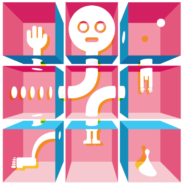

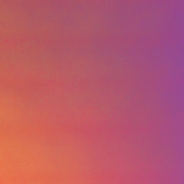
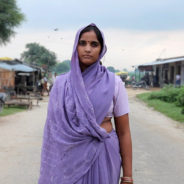
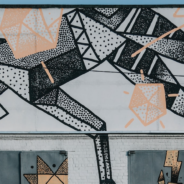
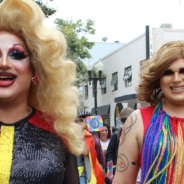
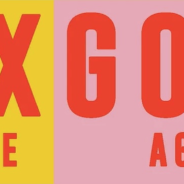
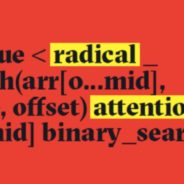
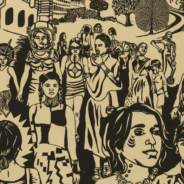
Recent Comments